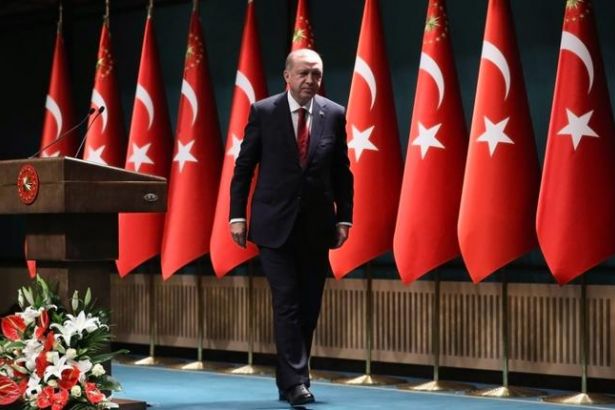Turkey's administrative system restructured with new decrees

Following an oath-taking ceremony on July 9, Turkey's President Recep Tayyip Erdoğan started fast to rule the country as an executive president with sweeping powers. The executive presidential system was brought about by the June 24 elections.
The AKP government has been issuing decrees, bypassing the parliament, since the state of emergency was imposed following an attempted military coup in July 2016. The new executive presidency grants Erdoğan the power not only to run the executive branch but also to lead his AKP party. Since the post of the prime minister office has been scrapped, Erdoğan selected his own cabinet recently. As the executive president of Turkey, Erdoğan has been granted the power to regulate ministries without parliamentary approval, to appoint high-level bureaucrats, issue presidential decrees, prepare the budget and impose the state of emergency.
On July 9, a new statutory decree was announced, adjusting Turkey's laws to the new presidential system.
ERDOĞAN TO RULE STATE THEATRES
The new statutory decree included changes on the law on state theatres. It ruled out the previous article that says "State Theatres are run by a general director", being replaced by a statement that says the internal management of a theatre is to be defined by a presidential regulation.
While necessary governmental subventions to a theatre used to be allocated by the council of ministers, now these decisions will be taken by the presidency. The general manager of State Theatres will, from now on, be granted governmental subvention as defined directly the president.
PRESS CARDS TO BE ISSUED BY THE PRESIDENCY
The Prime Ministry General Directorate of Press and Information was closed, and all its duties and authorities were handed over to the newly established Presidency Directorate of Communication.
The decision follows that the yellow press cards that used to be issued by the Prime Ministry General Directorate of Press and Information will be issued by the Presidency Directorate of Communication.
GOVERNORS AUTHORISED TO GRANT LICENCE TO CIVILIANS TO KEEP AND BEAR ARMS
Another regulation brought about by the new statutory decree, the governors are authorised to grant the licence to civilians to keep and bear arms.
The regulation enables the Ministry of National Defence to be authorised to sell only one firearm "to the civilians granted to keep and bear arms by the decision of the Presidency." While the annual bullet ration of the civilians had been 200 in 2017, it was increased to a thousand by the new statutory decree.
UNIVERSITY RECTORS NOT REQUIRED TO HOLD TITLE OF PROF.
Turkey's President Recep Tayyip Erdoğan has become the sole authority to assign university rectors, following the recent statutory decree. The decision of the Council of Higher Education (YÖK) used to be necessary for assigning university rectors previously. The two-term office period for university rectors was also ruled out.
The assignment of 14 out of 21 members of the YÖK was granted to Erdoğan since the Council of Ministers was abolished.
The university rectors are no longer required to hold the title of Prof. Dr., according to the new statutory decree.
A FOUR-YEAR UNIVERSITY DEGREE IS ENOUGH TO BE APPOINTED AS A JUDGE
Nuh Hüseyin Köse from Turkey's Union of Judges commented on the latest statutory decree regarding new regulations on judge appointment. Köse said that from now on, any university graduate holding a four-year degree will be eligible to take the exam on administrative jurisdiction to be appointed as a judge. The candidates are not required to hold a university degree on law. They can be graduates of physical therapy, medicine, philology and the like.
ERDOĞAN IS TO DESIGNATE MEDICINE PRICES
Rules and procedures of designating medicine prices are to be the responsibility of the president, according to the recent regulation on the organisational structure, duties and rules of the Ministry of Health.
The Ministry of Health will be responsible from the undertakings related to public health, studies on decreasing disease risks, medical services including diagnosis, treatment and rehabilitation, medical education and research, cosmetics and medical devices.
The Ministry of Health will also be responsible for granting and decertifying, necessary licences and permissions to public and private medical organisations and institutions.
9 SEPARATE BOARDS UNDER PRESIDENCY
As part of presidential decrees, nine separate boards are formed directly under the presidency. According to this new organisational scheme, the following boards are being formed: Science Technology and Innovation Policies, Educational Policies, Economic Policies, Security and Foreign Policy, Judicial Policies, Culture and Art Policies, Health and Food Policies, Social Policies and Local Administration Policies.
Apart from these boards in charge of proposing policies, the State Archives Directorates, Strategy and Budget Directorate, Communications Directorate, the National Palaces Directorate are being placed under the president's command.



